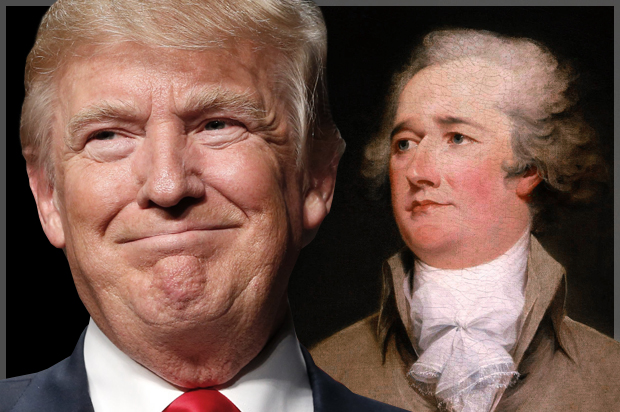With just days to go until the real election of 2016 — the Electoral College — the rogue faction known as the Hamilton Electors is making one last-ditch effort to save America from Donald Trump by denying him the 270 votes he’ll need to be officially named president.
But can the Hamilton Electors convince enough of their fellows in the Electoral College to view Gov. John Kasich of Ohio as our era’s George Washington?
Their leaders, who named their group after Federalist Paper No. 68, say it’s still possible that they’ll succeed.
First, though, a word about the rules of the game: In theory, the 306 electors committed to Trump and the 232 electors committed to Hillary Clinton are allowed to disregard the voters of their states, denying any candidate the 270-vote minimum needed to win the presidency, and force the election to be decided by the House of Representatives. This has already happened twice — in 1800, when they averted an Aaron Burr presidency; and 1824, when they stopped Andrew Jackson from becoming president, although in that case only by delaying it for four years.
The Hamilton Electors — they’re led by Democrats — need to convince at least 37 Republican electors to abandon Trump.
“My personal goal is a little more lofty than 37,” Michael Baca, a Colorado elector, told Salon. “Because I don’t necessarily want it to just get sent to the House, where there’s a chance they could choose Donald Trump or choose a different Republican. My whole message regarding the Hamilton Electors has been unification of Americans. And so again, ideally, I’d like 135 Democrats and 135 Republicans to avoid the House altogether. Now that’s quite a lofty goal, but that’s what we’re aiming for. If we fall short, I do believe that we’ll still be able to weigh in on 37.”
“We haven’t landed on any individual candidate yet,” says fellow Hamilton leader Bret Chiafalo. “So even if we were deterred, it would be fine. There are plenty of options of good Americans who are experienced Republicans.”
Baca and Chiafalo have a long list of names of possible Republicans to replace Trump — Colin Powell, Condoleezza Rice, Jon Huntsman, John McCain and Mitt Romney were mentioned most often — but, as Baca makes clear, “the biggest name that we seem to be coalescing around right now is Gov. Kasich.” The only problem is that Kasich doesn’t want to be the group’s savior.
Gov. John Kasich statement on the recent news about the upcoming Electoral College meeting: pic.twitter.com/dm9yOfBqwF
— John Kasich (@JohnKasich) December 6, 2016
“I saw that tweet and I was, I’m not gonna lie to you, I was a little taken aback,” Baca says, “but the more I read that tweet, the more it reminded me of George Washington, our first president. And how in 1789, 69 electors unanimously voted for him and he was the reluctant leader. He was called into service.”
“When you look back at George Washington, and you look at how George Washington wanted to retire, he wanted to go back to Mount Vernon for the rest of his life after helping build our country,” Chiafalo adds. “But the Electoral College at the time, or the equivalent at the time, decided to vote for him unanimously. And he got a communiqué from the Congress saying that he had been elected. And instead of saying, ‘No, I’m retired, I said I didn’t want this,’ he stepped up.”
Chiafalo is a bit more cautious than Baca in his optimism about electing Kasich or one of the less likely Republican alternatives.
“What we’re doing is very clearly a long shot and we have no compunction about that,” explained Chiafalo. “It’s been clear from the beginning.”
Neither Baca nor Chiafalo would say whether they’ve talked to any of the candidates or how many Republican electors are discussing the possibility of defecting to Kasich. In Chiafalo’s view, the “biggest gain” for the movement was when Christopher Suprun, a Republican elector from Texas (and someone whom Chiafalo described as a “great American”), told the New York Times Monday that he would not be voting for Trump.
That, the Hamilton Electors hope, will inspire other electors to do likewise, even if Americans don’t learn of their decision until Dec. 19.
Twenty-nine states require their electors to vote for the candidate who received the most votes within their borders, and while Chiafalo believes these laws are unconstitutional, it is unclear the extent to which breaking them might invalidate their ballots. In North Carolina, Michigan and Utah, deviating from the state’s popular vote is considered an automatic resignation and the elector is replaced, according to the National Conference of State Legislatures. Most of the states only impose penalties, criminal or otherwise, on faithless electors after they have voted.
Regardless of what happens, the Hamilton Electors feel the risk is worth it.
“This isn’t about getting a Democrat in. This isn’t even about getting a Republican in. This is about stopping Donald Trump,” Chiafalo said. “This is about stopping the most unfit president we would have ever had by far.”


